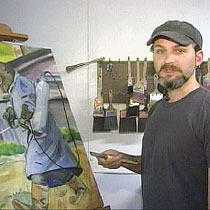2007年VOA标准英语-Collectively Working For Change(在线收听)
Washington
30 May 2007
Nestled in the mountains of the eastern state of West Virginia is an unusual farm. Here, two-dozen people live together at the Zendik Farm, a commune where everything is shared, from work to property. To make ends meet, the group sells merchandise emblazoned with a catchy slogan that inspires individuals to take action for change. It's not an easy life, but as VOA's Yi Suli recently discovered they seem to love their work. Jim Bertel narrates.
"My name is Kaila,” begins a telephone call. ”I'm calling from Zendik Arts, where some 20 artists live and work together in West Virginia. We have an organic farm and dance company and we want to take over the world."
Zendik Farm, a commune in West Virginia, is home to Kaila and others who have taken fanciful names and changed their way of life. They have given up most of their personal property to pursue their love of arts and collectively run the farm.
"This is the kitchen, the main kitchen,” explains another commune member, Arol. “And it was a garage. We redid it. About 24 or 25 can eat at these tables."
Arol, 68, became the leader of the farm after her partner Wulf, the founder of the farm, died. They started the farm at the height of the Hippie culture in 1969.
"We wanted to survive without government help, without getting regular jobs. We wanted to see,” says Arol.
Since then, Zendik Farm has moved from California to Texas, Florida, and North Carolina. Today, it occupies 80 hectares in Marlington, West Virginia.
 |
| Rev |
"We have kept with the idea of creative survival through art,” explains Arol, “and through the art, reflecting what we believe in."
Shio is from Florida. She chose to live on the farm over a full scholarship for college. "I enjoy all those things very much. Learning is fun to me. But I can learn all of that here, from people that live here. From books and the Internet. But as far as going to school, that was torture."
Erim, son of an economic professor, grew up in the suburbs of Philadelphia. "I was very unhappy,” he says. “The people I was hanging out with were going (in) the wrong direction. And my life was headed that way too."
Fawn is the daughter of Arol and Wulf. Even though Fawn had the opportunity to compete for a scholarship with the New York City Ballet, she stayed on the farm where she feels she belongs, dancing, taking care of the horses, cows and goats, a life that can be hard at times.
"We live a pretty vigorous life. Our survival is…Physically we work very hard, very long hours," she says.
The commune members pay the bills by selling merchandise adorned with a catchy slogan calling on people to take personal responsibility to bring about change.
"It just means that we need to stop complaining,” says Fawn. “Stop saying the same thing over and over again. And we have to start to take action."
Between selling merchandise and doing chores, life on the Zendik Farm can be hard. But as one member says, life is hard. "It is whether you enjoy it or not that makes the difference.”